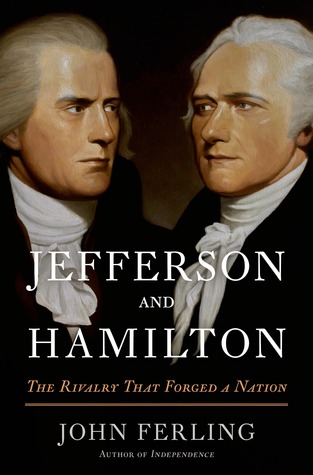Today I'm looking at a history book about two major figures in the early history of the United States, Thomas Jefferson and Alexander Hamilton. Both individuals came from very different backgrounds and had very different visions for what the American republic would look like and their legacies are mixed. Hamilton helped craft the fiscal organs that allowed the United States to become the economic superpower of the world, although with wealth and power being concentrated in fewer and fewer hands. Jefferson was an outspoken proponent of egalitarianism and an agrarian lifestyle where all men could be free and independent, which becomes much more ironic considering Jefferson's membership in the wealthy and powerful planter class of Virginia and reliance on slave labor to maintain his lifestyle. Neither man was perfect, despite hagiographic attempts by many, but their continued influence on the United States is remarkable.
What I found most interesting about this book was Ferling's decision to focus less on Jefferson and Hamilton's debate over the power of the central government, which is what I'm far more familiar with in the classes I've taken. The crises of the American Revolution and the inability of Congress to pay or equip its army taught Hamilton the necessity of a strong central government with the ability to fund and raise armies, as well as financial institutions and other networks to create a rich and strong United States. Jefferson, by contrast, supported a far more limited view of centralized government and, with James Madison, began putting forth ideas which would lead to the doctrine of state nullification and eventually the crisis of the American Civil War. I generally fall on the side of Alexander Hamilton in this argument, and I freely admit that it's largely because I have the benefit of hindsight and knowing where the doctrine of limited government ultimately leads.
But this did lead to some confusion on my part in the very beginning of the book when Ferling explained the devotion of Republicans to Hamilton and Democrats to Jefferson, even in modern times. Especially after the great shift in politics around the Franklin D. Roosevelt administration, Democrats have increasingly become proponents of the strength of the federal government and its ability to improve life for Americans, while Republicans have increasingly become proponents of limited government. Ferling manages to make a much more cohesive argument by focusing less on Hamilton and Jefferson's respective policies on central government and more on individual freedom.
There is a certain amount of irony in the positions that both Hamilton and Jefferson ended up taking on personal liberty in their lifetimes. Hamilton was born out of wedlock and poor in the Caribbean islands. He worked for a few years at a merchant firm but his intellectual curiosity convinced a number of prominent citizens on the island to sponsor his education at university on the mainland. Hamilton spent many years working as Washington's aide-de-campe, entered legal practice, and managed to join the elites of American society. Over his lifetime, however, Ferling shows how Hamilton became increasingly reactionary and distrustful of common people and democracy. Hamilton was definitely behind the Alien and Sedition Acts of 1798 which effectively gutted the First Amendment. So Hamilton, who benefitted greatly from upward social mobility, wanted to prevent that same upward mobility for other people.
Jefferson, by contrast, was a son of privilege and was from the very aristocratic classes which Hamilton aspired to join. But Jefferson, at least as Ferling argues, was a very strong proponent of democracy and liberty. Ferling exhibits how through his entire career Jefferson was extremely interested in land reform and creating a society of independent yeoman farmers. Over the years Jefferson embraced the democratic spirit and reveled in the abandoning of pomp and ritual in American society and the creation of a more egalitarian society. It certainly seems odd that Jefferson, a member of the aristocracy himself, would welcome the breaking of aristocratic power and the increased democratization of the United States.
Looking at Hamilton and Jefferson through these lenses, the respective parties adoration for these figures makes much more sense. The Republicans, not entirely unfairly, have been seen as allied with the wealthier segments of the American population while the Democrats are more strongly allied with the poorer segments of the population. If we view Hamilton and Jefferson on a rich vs. poor scale than a strong authority vs. weak authority then the allegiances of modern political parties to their ''founding fathers'' makes a lot more sense.
My biggest concern with this book is that Ferling feels a little too hagiographic of Jefferson, although that may be some of my deep-seated distrust of Jefferson because of where the weak central authority argument leads. (As well as my preference for an industrialized economy over an agrarian. I am an urban dweller.) Ferling himself says in the beginning that he didn't care terribly much for Alexander Hamilton when he started on this project and came to respect him more as he did research. But that does make me concerned because Ferling seems much more forgiving of Jefferson's faults than he is of Hamilton's. Ferling does seem to dance around Jefferson and his position on slavery, which is definitely one of his greater foibles.
Despite my reservations I think this is a pretty good biography of both Jefferson and Hamilton. The book ends rather abruptly in 1804 when Hamilton is killed by Burr in their famous duel, and the last twenty-two years of Jefferson's life are briefly glossed over, so I think it's a little inadequate as a biography for both men. However, it's definitely a good look at political and economic thought in the United States during the late eighteenth and early nineteenth century. But if you want more detailed information on both men, I'd recommend reading additional biographies.
- Kalpar


No comments:
Post a Comment